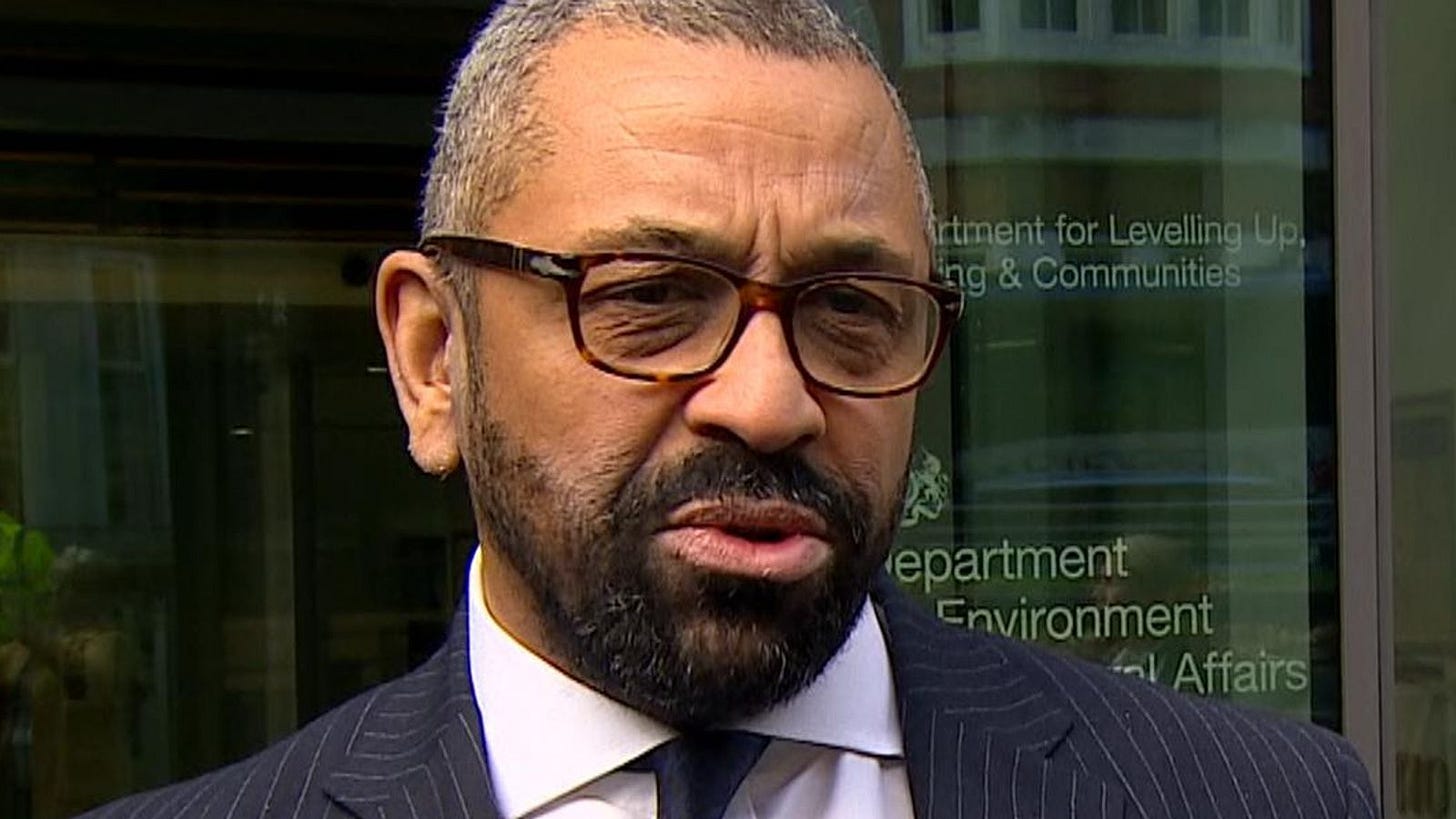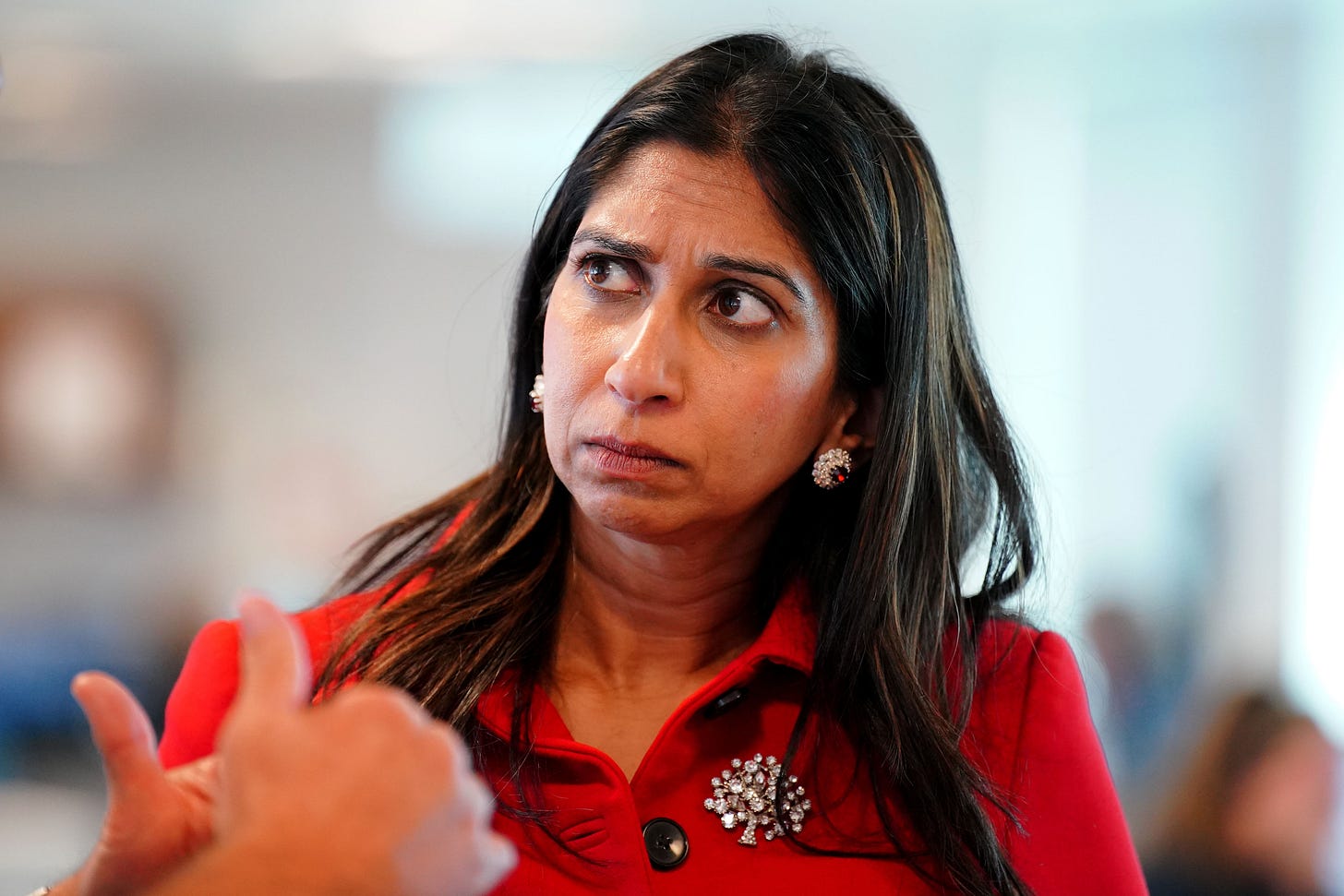Boxing Cleverly: the new home secretary
James Cleverly has spent a year globetrotting as foreign secretary, doing a job he loved, but now takes one for the team and is front and centre on key policy areas
James Cleverly, the 54-year-old MP for Braintree, has not yet celebrated a decade in the House of Commons, yet he is leaving the Foreign Office after more than a year as the UK’s chief diplomat. Yesterday Rishi Sunak, shuffling his top team, made Cleverly an offer he couldn’t refuse: he became home secretary, stepping into a gap caused by the ridding of the prime minister’s own turbulent priest, Suella Braverman.
Appointed by Liz Truss but retained by Rishi Sunak, Cleverly has been a quietly effective foreign secretary. His open, straightforward manner and sense of humour have established a rapport with Antony Blinken, the US secretary of state, France’s Catherine Colonna and even, albeit gingerly, with China’s foreign minister Wang Yi. A well-dressed lieutenant colonel in the Army Reserve, he is nevertheless at ease on social media, giving a professional verdict on the Netflix series The Diplomat.
When Sunak decided that Braverman had to go, the candidates to replace her at the Home Office were few: of her junior ministers, neither Robert Jenrick nor Chris Philp quite convinced for the top job, while Tom Tugendhat, the impressive and articulate security minister, is a perceived rival. That is the kind of challenge which spooks Sunak, ruling him out. Of the existing cabinet, Michael Gove was too complicated and has a baggage train to rival Napoleon’s Grand Armée, Oliver Dowden too busy running the Cabinet Office and Penny Mordaunt another dreaded rival. So despite having said that “you will see nail marks on the parquet floor in my office” if he was moved from the Foreign Office, Cleverly was ‘invited’ to fill the vacancy.
Within hours of his appointment, Cleverly embraced a tone strikingly different from Braverman’s. His social media message was clear: “My job is to keep people in this country safe.” He reiterated that his priority is that “Everybody, everybody is able to go about their lives in peace and security”. For a minister replacing someone dismissed for using divisive language, these remarks are markedly inclusive, recasting the Home Office, too easily a department of ‘us vs them’, as a protective shield thrown round the whole community.
It was also noticeable that Cleverly stressed “supporting the police” as one of his priorities. This is no accident. Last week, Suella Braverman wrote an opinion piece in The Times in which she talked of a perception that “senior police officers play favourites when it comes to protesters”, and offered heavy-handed advice on maintaining public order. The police, especially the Met, have serious questions to answer, but to have the issue expressed so publicly by the home secretary was shocking.
This is a not a Year Zero. Cleverly has reiterated the pledge to “stop the boats”, though even here he wrapped it in a narrative of protecting the community and tackling illegal migration made possible by “evil people-traffickers”. One of the prime minister’s five priorities for 2023 is “passing new laws to stop small boats”, and the Illegal Migration Act 2023 has been on the statute book since July, so that is a non-negotiable part of the brief.
Nevertheless, when he addressed Home Office civil servants at their Marsham Street headquarters yesterday, his message was one that Braverman would never have chosen.
I hope that we get to a way of working together where we’re able to discharge the primary duty that we have, which is to protect the British people, to such an extent they forget we exist.
Cleverly went on to praise officials, saying he would defend them even when mistakes were made. “I have no intention of briefing against my officials,” he declared, “all I ask is that you return the favour.”
The first major challenge will come on Wednesday, when the Supreme Court will rule on whether the government’s plans to transfer asylum seekers to Rwanda is lawful. In June, the Court of Appeal decided that Rwanda was not a safe country for refugees because they might be returned to their country of origin. If the Supreme Court overturns the ban, transfers to Rwanda, which Braverman once described “dreaming of”, could begin early next year.
If, however, the Supreme Court upholds the verdict that the Rwanda plan is unlawful, Cleverly faces a major challenge. Braverman had overtly paved the way for an all-out assault on the European Convention on Human Rights. Cleverly, by contrast, has said that he is “not convinced” by the case for withdrawal from the ECHR, which would place the UK alongside Russia and Belarus “a club we [don’t] want to be part of”.
As a persuasive and likeable communicator who has Brexiteer credibility—he was a subscriber to the European Research Group and his first ministerial job was at the Department for Exiting the EU—Cleverly has a small window potentially to transform the Conservatives’ pitch on law and order.
A home secretary from a mixed-race background, who has undergone stop-and-search and remembers National Front marches, but who has a straightforward military practicality and fundamental optimism and believes Britain is “the best place in the world” to live as a black person; a minister who instinctively supports the police but thinks they need to reform themselves urgently. Cleverly’s conception of his role as keeping the British people safe in its widest sense offers an attractive way forward for the Home Office. Will he be able to take it?






Also worth noting that Cleverly is a rare non-Oxbridge and non-uni graduate in a great office of state!
As an ex Metcop be nice to have a rational sane HS for once who might actually seek advice on law before twll8ng cops what to do and how to do it. If he wants to make cop friends he could end the barbaric inquisition masquerading as police misconduct/ gross misconduct system, abolish PCCs, reinforce pol operational independence and support creation police mental health support service. That be nice.